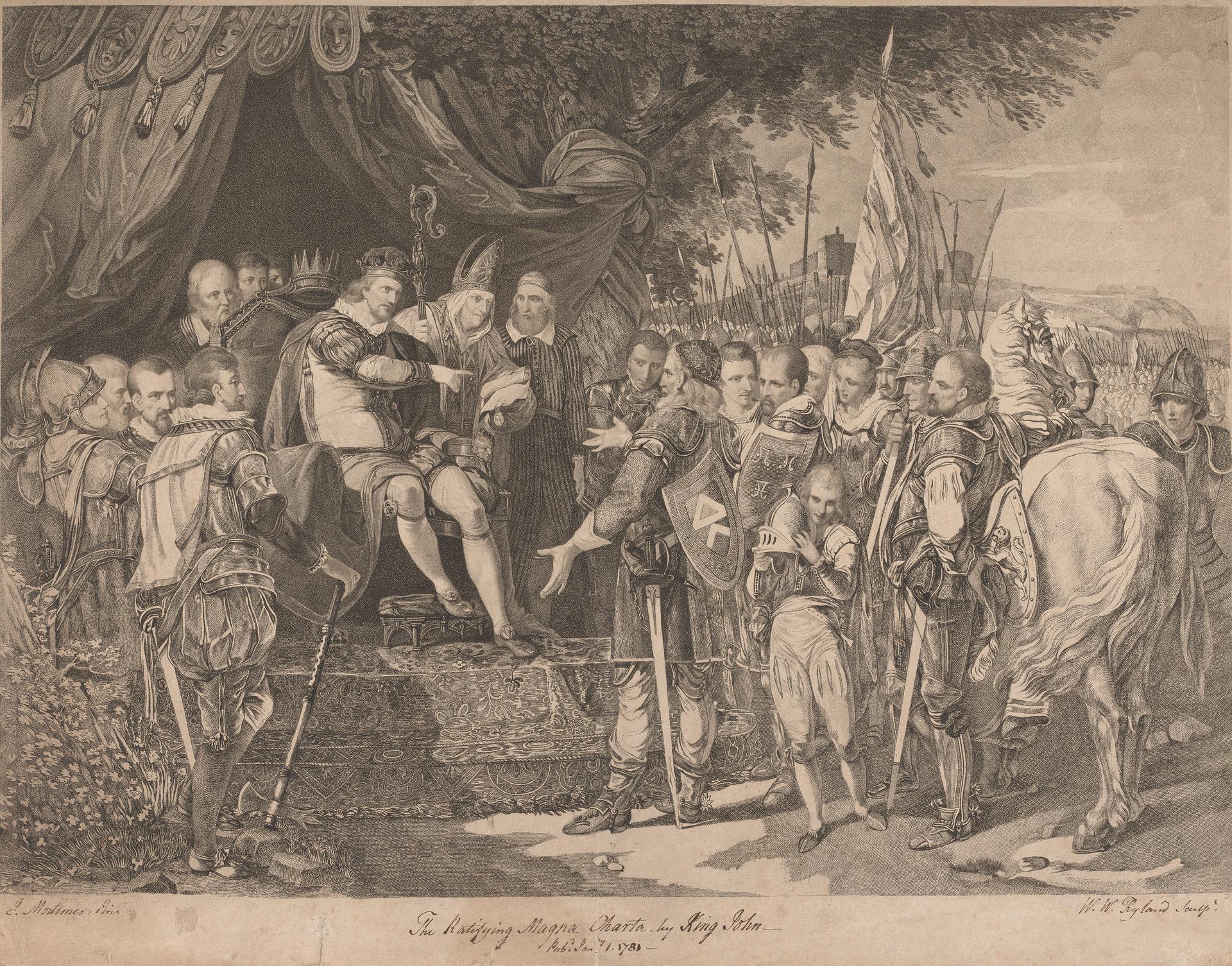Colonial Americans did not think of themselves as Americans until the last third of the 18th century. They thought of themselves as English people living outside of Great Britain, but within the British Empire. They considered themselves heirs to the English legal tradition and English constitution (an uncodified constitution). They often relied on and emphasized their rights as Englishmen.
American law traces its origins to the landmarks of English legal and constitutional development. The earliest development was the Magna Charta. The Magna Charta was an agreement between King John I and the main English barons. On June 15, 1215, the English barons besieged King John I on Runnymede Island. The barons forced the king to sign the Magna Charta.
The Magna Charta ended for England the rule of absolute monarchs. The “great charter” established the rule of law. This means the principle that everyone, including the king, is subject to the law. No one is above it. Most importantly for our purposes, the Magna Carta’s principles significantly influenced the development of American democratic governance. They also shaped legal systems, most notably the U.S. Constitution and Bill of Rights.
For instance, Article III, Section 2 of the U.S. Constitution is based on Chapter 17 of the Magna Charta. The U.S. Constitution states: “[the] Trial shall be at such Place or Places as the Congress may by Law have directed.” This is closely modeled from The Magna Charta, Chapter 17. “Our Common pleas [trial courts] shall not follow our court [that is the ‘Royal Court’]. They shall be held in some fixed place.” Why were the Framers and English concerned about having a fixed, designated location for trials and lawsuits? In the past, lawsuits and trial courts moved with the Royal English Court across the country. They went to wherever the Royal Court happened to be. The danger, of course, was that a legitimate lawsuit would never be heard. The Royal Court ultimately exercised the authority of the hearings and trials. The Framers of the U.S. Constitution relied explicitly on the Magna Charta in preparing this part of the U.S. Constitution.
Similarly, the 8th Amendment to the U.S. Constitution (the Bill of Rights) relies explicitly on Chapter 20 of the Magna Charta. The 8th Amendment states: “Excessive bail shall not be required, nor excessive fines imposed, nor cruel and unusual punishments inflicted.” (Emphasis added.) Chapters 20 and 21of the Magna Charta state: “A freeman shall not be amerced [that is, punished with a fine] for a slight offense, except in accordance with the degree of the offense; and for a grave offense he shall be amerced [that is, punished with a fine] in accordance with the gravity of the offense….Earls and barons shall not be amerced [that is, punished with a fine] except through their peers. It must be only in accordance with the degree of the offense.” Both the 8th Amendment and Chapter 20 of the Magna Charta emphasize that fines may not be excessive. The fine must match the offense for which the person is fined.
Congress’s exclusive authority to “fix the Stand of Weights and Measures” stated in Article I, Section 8 of the U.S. Constitution reflects the Framers’ reliance on Chapter 35 of the Magna Charta. This chapter states: “Let there be one measure of wine throughout our whole realm; and one measure of ale; and one measure of corn, to wit, ‘the London quarter’; and one width of cloth…of weights also let it be as of measures.”
Many other aspects of American law, such as due process and probable cause, are first articulated in the Magna Charta. Chapter 39 of the Magna Charta lays down the foundation for due process rights. It also highlights the cherished individual liberty that Americans value. “No freemen shall be taken or imprisoned or disseised [dispossessed of land] or exiled or in any way destroyed.” No one will proceed against him. No one will send against him. They will act only by the lawful judgment of his peers or by the law of the land.
The Magna Charta is extremely significant to America’s legal heritage. The American Bar Association considered it so important that they paid for a monument. This monument commemorates its signing at Runnymede, England. The American Bar Association held a ceremony dedicating the monument in 1957 in Runnymede. The U.S. Supreme Court Justice and other U.S. Supreme Court justices attended as well as important members of English courts and Parliament. The monument symbolizes the enduring principles of freedom and law established by the charter. , which is considered a foundational document for law and democracy not only for America, but worldwide.

